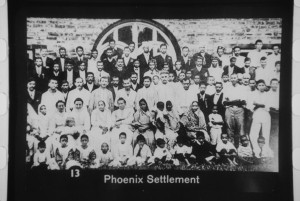January 15
“True economics is the economics of justice.”
–Gandhi (Gandhi paraphrasing Unto this last, pp. 50-53, from Sarvodaya, p. 33)
(After reading John Ruskin’s Unto this Last Gandhi established Phoenix Settlement in South Africa.)
A woman steps out of her limousine in front of a five star hotel. Money is falling out of her pockets and she doesn’t seem to notice. She turns to the doorman, “Please send someone to carry my son to our room.” The employee looks at her and says immediately, “I’m so sorry, madam; I didn’t realize your son can’t get up the stairs on his own.” “Oh, certainly he can, my dear,” she replies, “but thank God he doesn’t have to.”
The worst part of this already terrible joke is that it reflects a ridiculous image of the human being who is living the “dream” of an unjust economic system. She has been misled to believe that it is in ignoring, instead of cultivating, our capacities that we can find happiness and peace of mind. The human being does not work that way, and neither will our human systems flourish when we base them on that image.
Gandhi, while not an economist in any formal sense, was confident in the power of new economic models. In fact, it was after reading John Ruskin’s Unto This Last while in South Africa in 1902 early in his career, that he set up his first experiment in communal living, Phoenix Settlement. By sharing what we have, he realized, we minimize our needs and many of the injustices between us. He was convinced that economics could be the expression of our human goodness, our awareness of the whole of life and our capacity to serve others.
Such an economics would boil down to three key principles. First, it embraces the duty of paying fair wages, because we seek to see our well-being in the well-being of all. I cannot do well in the fullest sense of that term when others cannot support themselves. By the same token, we would take what we needed and nothing more. If I need less than you in my quest for service and simplicity, I can accept less, and vice versa. Competition would not cease, but, he maintained, it would be a competition based on the development of our skills, not on our willingness to work for less money than others because we have no other chance of getting the work we need to live. And most importantly, we would view everything we have as a trust, nothing would be used or directed toward harming life.
Three simple ideas: and so challenging to put into practice without a vision of the human being as something other than a material entity in competition with others in a world of scarcity and violence. But not impossible, either.
Experiment in Nonviolence:
Look at your most prized possession. What would change if you saw it as a trust for the service of all?
Daily Metta 2015, a service of the Metta Center for Nonviolence, is a daily reflection on the strategic and spiritual insights of Mahatma Gandhi in thought, word and deed. As Gandhi called his life an “experiment in truth,” we have included an experiment in nonviolence to accompany each Daily Metta. Check in every day for new inspiration. Each year will be dedicated to another wisdom teacher.









